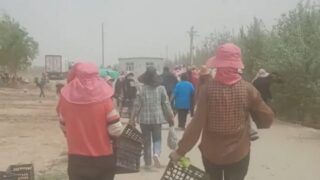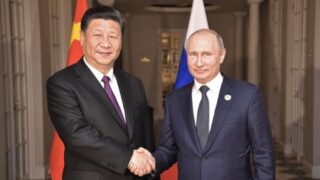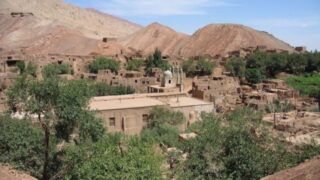Despite Beijing’s denials, the U.N. agency found evidence of slave labor and even torture.
by Ruth Ingram


China’s forced labor practices have been spotlighted in a damning investigation that found “extraordinary hardship, coercion, and physical and psychological torture” at the heart of its treatment of Xinjiang Uyghurs.
Despite identical abuses uncovered in 2020 and 2021, Beijing continues to ignore world outrage, deny abuse, and persist in presiding over labor irregularities that have seen almost two million Uyghurs and Turkic people sent across Xinjiang and inner China to work against their will, according to the United Nation’s International Labour Organization’s (ILO) latest annual report.
In direct violation of ILO rules, which China itself helped set up in 1919 as a founding member, the International Trade Union Confederation’s (ITUC) probe of the situation in Xinjiang found multiple breaches of protocol under the guise, according to Beijing, of “poverty alleviation,” “vocational training,” “re-education through labor” and “de-extremification.”
Outlining the genesis of the camps, the ITUC described the escalation of their building program in 2017 with 39 centers tripling in size. Having first denied their existence, undeniable satellite evidence saw Beijing backtracking in 2018 by referring to the camps as “vocational education and training centers.” Further massaging of the concept saw them later re-branded as “boarding schools that provide job skills to trainees who are voluntarily admitted and allowed to leave the camps.”
The ITUC found proof of forced or compulsory labor in or around internment or “re-education” camps housing at least 1.8 million Uyghur and other Turkic and/or Muslim peoples in the region, as well as in or around prisons and workplaces across Xinjiang and other parts of the country.
The facilities, in direct contravention of ILO rules to protect ethnic identity and religion, are “central to an indoctrination programme focused on separating and cleansing ethnic and religious minorities from their culture, beliefs, and religion,” whose reasons for internment have been as diverse as knowing someone abroad, sporting a beard or a headscarf, or applying for a passport, the report found.
The ILO findings mirror those of Dr Adrian Zenz whose exhaustive trawling of Chinese government websites found a two-pronged attack on the Xinjiang labor force ensuring that both so-called “surplus rural labor” and “graduates” of vocational training were corralled into full time work. Zenz estimated that up to 1.6 million and around 60 percent of rural surplus laborers across Xinjiang were at risk of being coerced into forced labor under the ILO definition. Factories linked to “vocational training” are often managed in a “semi-military style” and characterized by “police guards and security equipment provided by the state,” he has concluded.
The ITUC alleges prison labor, mainly in cotton harvesting, the manufacture of textiles, clothing and footwear. At least 80,000 Uyghurs and other ethnic minority workers, it found, have been transferred from Xinjiang to factories in Eastern and Central China as part of a “labor transfer” scheme under the heading “Xinjiang Aid.”
Workers have no choice in the matter on pain of threats of their own or their family’s detention if they refuse, alleges the ITUC. Leaving the borders of Xinjiang behind, they live and work in segregation, are subjected to compulsory Mandarin classes, and are prevented from practicing their culture or religion. According to the ITUC, they are monitored continuously, and out of work hours are spent in dormitories. Impossible production targets are the axe over their head, and where wages are paid for the draconian working hours, deductions often reduce the salary to almost nothing.
Generous incentives and subsidies are offered to companies that build factories near the camps and train and employ detainees for work at home or across China. Compelling testimonies from the 35,236-strong “Xinjiang Victims Database” of ethnic minority members forcibly interned by the government since 2017 has added weight to the ITUC findings.
Beijing hit back vehemently at every point raised by the ILO and strongly defended its labor policies. Dismissing evidence based on the Xinjiang Victims Database as a “tool used by anti-China forces to attack China by smearing Xinjiang,” China’s Foreign Ministry Spokesman Wang Wenbin addressing a press conference on February 14, 2022, reiterated his government’s firm stance on protecting the rights and interests of laborers. “We protect the right to equal employment, the right to equal participation in economic and social life, and equal access to development outcomes of laborers of all ethnic groups,” he said. Unhappy that his own response to the ILO findings was not accepted, he reaffirmed China’s egalitarian treatment of ethnic minorities in Xinjiang.
Notwithstanding Beijing’s denials, the ILO committee voiced its alarm at the illegal detention of large numbers of Uyghurs held incommunicado for long periods under the pretext of countering religious extremism, and their mass disproportionate surveillance. Confiscation of passports of all residents of Xinjiang was deeply concerning as was reluctance to allow Uyghurs to leave the country.
The ILO took exception to Beijing’s methods and the denial of the basic rights of Turkic people to choose their own employment and to express their own religion freely. Alarmed at terrorist profiling based on an individual’s ethnicity, national origin and religion and the resultant discrimination in employment and forced labor practices, it urged an immediate review of current policies.
The ILO called for de-radicalization programs imposed on companies and discrimination based on race, ethnicity, religion and political affiliation to cease; for more transparency over the kind of vocational guidance and training offered to detainees and to prove that China had replaced the current extra-legal custodial options with legitimate courses and genuine equality of opportunity, whether Uyghurs wanted to work in Xinjiang or further afield.
The World Uyghur Congress hailed the report as timely and vital in highlighting the labor abuses in Xinjiang. Britain’s ambassador in Geneva, Simon Manley decried the far-reaching human rights violations in Xinjiang. He welcomed the report in an interview with Associated Press, saying, “it adds to the growing number of voices expressing deep concern about the situation in Xinjiang.”









